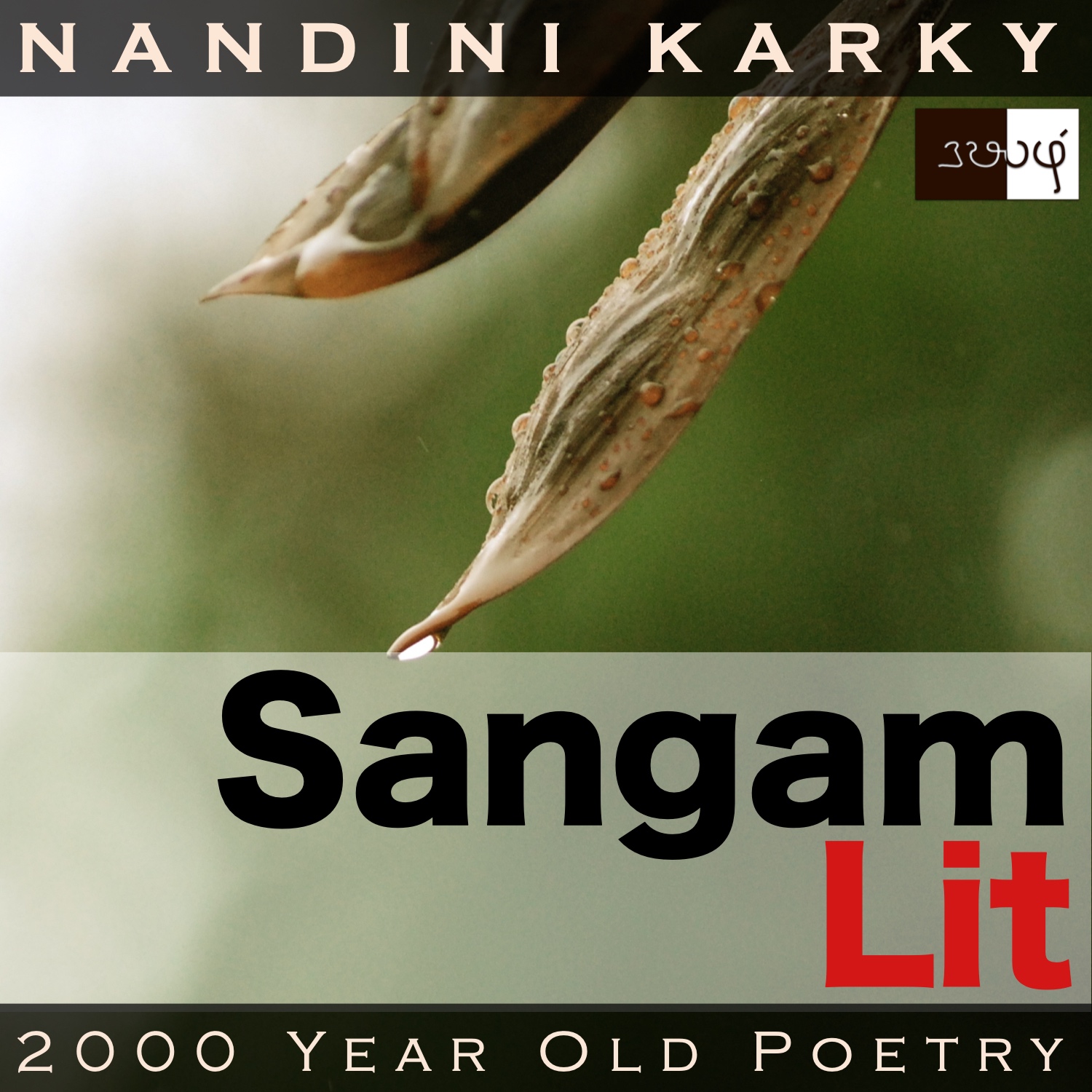Podcast: Play in new window | Download
Subscribe: Apple Podcasts | Spotify | Amazon Music | Android | iHeartRadio | Email | TuneIn | RSS | More

In this episode, we perceive a novel way of sharing disconcerting news, as depicted in Sangam Literary work, Natrinai 129, written by the Sangam-age Avvaiyaar, a prolific female poet who has penned more than 50 Sangam poems. Though the name is the same, Avvaiyaar of ‘Aathichoodi’ fame, belonged to the later medieval period. The poem is set in the ‘Kurinji’ landscape or mountain country and speaks in the voice of the confidante to the lady, conveying a hard-to-accept message in a subtle manner.
பெரு நகை கேளாய் தோழி, காதலர்
ஒரு நாள் கழியினும் உயிர் வேறுபடூஉம்
பொம்மல் ஓதி நம் இவண் ஒழியச்
செல்ப என்ப தாமே, சென்று,
தம் வினை முற்றி வரூஉம் வரை நம் மனை
வாழ்தும் என்ப நாமே, அதன்தலை,
கேழ் கிளர் உத்தி அரவுத் தலை பனிப்பப்,
படுமழை உருமின் உரற்று குரல்
நடுநாள் யாமத்தும் தமியம் கேட்டே.
A ‘loud laugh’ welcomes us into the poem with the words ‘பெரு நகை’. As we wonder about the reason why, in contrast, we see serious words ‘உயிர் வேறுபடூஉம்’ meaning ‘life that changes and slithers away’. ‘அரவுத் தலை’ meaning ‘snake’s head’ and ‘படுமழை உருமின்’ meaning ‘heavy rain and thunder’ bring back the favoured imagery seen in many Sangam poems of thunder striking down a snake. From words, let’s move ahead to explore the meaning held within.
The man and woman have been in a married relationship and the time comes for the man to leave the lady on a mission. The man, fearing that he would hurt the lady, if he were to convey the news directly to her, takes it to her confidante. The confidante decides on a novel approach of breaking the news to the lady and says to her, “Listen to this laughable news, my friend! Even if your lover were to part but for a day, your life would suffer and depart, O lady with flowing tresses! They say, leaving you behind, he is to journey and also that, till he finishes his mission and returns, you are to live in this house. On top of all that, they say, as heavy rains pour and the sky’s roar makes the bright spotted head of snakes tremble, you are to listen to that thundering voice at midnight, all alone!” With these words, the confidante sows the seed for preparing the lady to bear the pain of separation.
To understand the big picture, let’s delve into the minds of the characters portrayed. The confidante opens the topic of discussion as if sharing a joke. She explains what she means by saying that even if the man were to part away for just a day, the lady is of such a delicate nature that her life would suffer and depart. Knowing this well, how can the village people say that he’s about to leave her and travel on a task, adding that till he returns, the lady is to remain in the house. How is this possible at all, she asks. As if all this talk weren’t enough, they add that he will stay away during the rainy season, and when there’s a downpour and thundering skies that make snakes tremble, the lady too is expected to stay all alone at midnight, listening to that uproar in the sky. The stress is on the words ‘all alone’ and with this narration, the confidante paints a vivid picture of what’s to come, while cloaking it as a joke and a thing that could never happen!
Is the lady such a delicate creature that she cannot bear even a day’s separation? On one hand, there’s the portrayal of a woman who cannot even dream of living apart from her man and on the other hand, we see that these words are penned by a female poet. Here, we have an emancipated woman penning verses and standing shoulder-to-shoulder with the male poets of her time, in the court of kings and chiefs. But the same words of this poet paint a different picture of womanhood then. Was this poet an exception then? The contrast kindles so many thoughts about the true nature of a Sangam woman. While those questions remain, we have to admire the ingenuity in the confidante’s ruse. She takes elaborate steps to reveal what may seem a simple thing to us. The lady’s partner is leaving her for a few months and going on a mission of his own. Such situations arise even today and while, there’s sure to be pain in the parting, would we consider that as life-threatening? I doubt it! Perhaps, that was an age and culture where the man and woman saw themselves as ‘one life’ in the deepest sense of that phrase. We, broken down, as individuals, seem not to be affected as much as this lady portrayed here. And yet, if we pause to sense the void that fills our heart, unexplainable, we will hear echoes of that lady’s feeling across the eons. In all this, we can only marvel at the attention paid to the littlest of things in those tiny corners of one’s mind!




Share your thoughts...